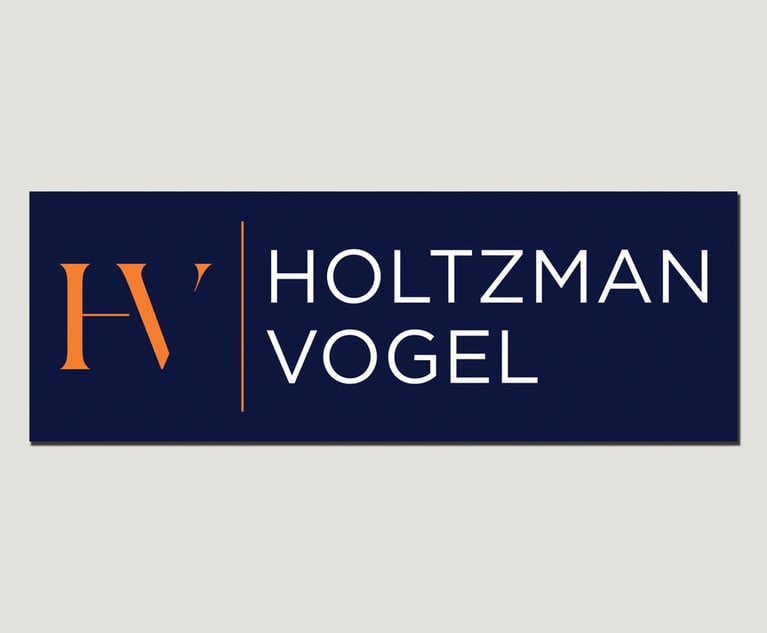 New York City, USA.
New York City, USA.Allen & Overy Brings Fuse Incubator to Its New York Offices
Allen & Overy is betting in-person networking between its New York City-based staff, clients and four startups from its Fuse incubator will spur a host of actionable ideas and innovation.
January 09, 2019 at 12:00 PM
5 minute read
The original version of this story was published on Legal Tech News
This week, attorneys at Allen & Overy's New York office are being tasked with bringing some creativity to legal services. But they won't be doing it alone. As part of the law firm's “U.S. Legal Tech Week,” its New York-based attorneys and clients will have a chance to interact and collaborate with four startups from the firm's Fuse incubator.
To be sure, this isn't the first time these Allen & Overy attorneys have come into contact with Fuse. Shruti Ajitsaria, head of Fuse and counsel at Allen & Overy, said the firm regularly hosts video conferencing sessions between its worldwide offices and its incubator, which is housed at the firm's London headquarters.
The U.S. Legal Tech Week, however, will be the first chance attorneys in New York get to interact with Fuse startups in person. “What we haven't been able to do up until now is bring [Fuse] members to New York and develop a relationship of trust and a one-to-one relationship,” Ajitsaria said.
Fuse, which launched in 2017 and supports a rotating mix of eight startups, is somewhat different from other incubators in the legal market in that it focuses solely on fostering legal tech innovation and forgoes equity investment.
Instead, Allen & Overy offers each startup in its incubator office space and direct access to the firm's attorneys and clients for advice and support. In return, the firm gets early access to each startup's technology, and importantly, a chance to work together on ideas around improving legal services.
For the firm's New York attorneys and clients, this was the week to capitalize on those benefits. “We've organized [Legal Tech Week] in a very structured way,” said David Lucking, a partner and head of the firm's U.S.-based International Capital Markets Group.
At the end of the week, Allen & Overy's New York office will have had around 100 client meetings about Fuse, a client networking event, a partner-level meeting to discuss legal tech ideas, and five days of “open sessions” where anyone at the office could meet with Fuse startups one-on-one and sample the technology, he added.
The four Fuse startups participating in U.S. Legal Tech Week include Avvoka, a contract drafting, workflow and analytics platform; Regnosys, a regtech company that aims to help the financial industry with regulatory compliance; Signal Media, an artificial intelligence-powered intelligence firm; and Nivaura, a platform that uses blockchain technology to automate the issuance and administration of financial instruments.
Nivaura is the only startup Allen & Overy has invested in, a choice that Ajitsaria said “makes sense from a strategic perspective,” given the startup and Allen & Overy's historical focus on bond issuance work. Most other Fuse startups have received funding from a variety of venture capital and other investors.
Ajitsaria added that some of the startups, such as the ones impacting the financial industry, were chosen for Legal Tech Week to spur New York-based clients' interest in what Fuse is doing, while others were chosen to help the office's attorneys think about new ways of working internally.
In addition to New York, the firm will also bring these four startups to its Washington, D.C., offices on Jan. 14, for a one-day event. Allen & Overy also held a similar Legal Tech Week recently in Singapore last November, which was attended by local government representatives.
Given that Fuse only works with its startups for a limited time, which is officially set at six months but usually extends beyond that depending on the engagement, the technologies Allen & Overy attorneys come into contact with can constantly evolve.
Yet since the firm doesn't invest in most of its startups, there is always a risk a Fuse startup will forgo developing technology specifically for the legal market. Last July, for instance, one of Fuse's previous startups, Bloomsbury AI, a natural language processing company, was acquired by Facebook to help in its efforts to combat “fake news” on the social media platform.
Ajitsaria, however, noted that Bloomsbury AI wasn't solely focused on legal tech, adding that Fuse's aim is include tech companies from outside the traditional legal market. “I think Bloomsbury AI was a good lesson for us because it is about pushing the boundaries, and it wasn't about using the same legal tech vendors that everyone is looking at and licensing from.”
Still, she noted that many of the startups currently in Fuse were founded by former lawyers and are primarily focused on the legal market.
Ajitsaria, who is an angel investor herself, also explained Fuse's decision not to take equity in most of its startups by noting that other law firms may be hesitant to use technology that is partially owned by a competitor.
She believes that law firm investment in AI contract review platform Luminance, for example, “really hampered them. I haven't seen them get the same traction as RAVN and Kira. Other law firms don't want to use technology that is in part held by another law firm.”
This content has been archived. It is available through our partners, LexisNexis® and Bloomberg Law.
To view this content, please continue to their sites.
Not a Lexis Subscriber?
Subscribe Now
Not a Bloomberg Law Subscriber?
Subscribe Now
NOT FOR REPRINT
© 2025 ALM Global, LLC, All Rights Reserved. Request academic re-use from www.copyright.com. All other uses, submit a request to [email protected]. For more information visit Asset & Logo Licensing.
You Might Like
View All
Pre-Internet High Court Ruling Hobbling Efforts to Keep Tech Giants from Using Below-Cost Pricing to Bury Rivals
6 minute read

As AI-Generated Fraud Rises, Financial Companies Face a Long Cybersecurity Battle
Trending Stories
- 1Florida’s Civil Procedure Rules: Attorneys Foresee More Settlements Amid Time Challenges
- 2Fla. Real Estate Deal Flow Picked Up Over the Course of 2024, Lawyers Are Bullish That Recent Legislation Will Keep Trend Going
- 3A Look Back: 2024 in Photos
- 4Clyde & Co Announces Combination With Dallas Insurance Boutique
- 5Experts Not Foreseeing More Rules Governing Prosecutors' Actions After Georgia Court's Removal of DA From Election Case
Who Got The Work
Michael G. Bongiorno, Andrew Scott Dulberg and Elizabeth E. Driscoll from Wilmer Cutler Pickering Hale and Dorr have stepped in to represent Symbotic Inc., an A.I.-enabled technology platform that focuses on increasing supply chain efficiency, and other defendants in a pending shareholder derivative lawsuit. The case, filed Oct. 2 in Massachusetts District Court by the Brown Law Firm on behalf of Stephen Austen, accuses certain officers and directors of misleading investors in regard to Symbotic's potential for margin growth by failing to disclose that the company was not equipped to timely deploy its systems or manage expenses through project delays. The case, assigned to U.S. District Judge Nathaniel M. Gorton, is 1:24-cv-12522, Austen v. Cohen et al.
Who Got The Work
Edmund Polubinski and Marie Killmond of Davis Polk & Wardwell have entered appearances for data platform software development company MongoDB and other defendants in a pending shareholder derivative lawsuit. The action, filed Oct. 7 in New York Southern District Court by the Brown Law Firm, accuses the company's directors and/or officers of falsely expressing confidence in the company’s restructuring of its sales incentive plan and downplaying the severity of decreases in its upfront commitments. The case is 1:24-cv-07594, Roy v. Ittycheria et al.
Who Got The Work
Amy O. Bruchs and Kurt F. Ellison of Michael Best & Friedrich have entered appearances for Epic Systems Corp. in a pending employment discrimination lawsuit. The suit was filed Sept. 7 in Wisconsin Western District Court by Levine Eisberner LLC and Siri & Glimstad on behalf of a project manager who claims that he was wrongfully terminated after applying for a religious exemption to the defendant's COVID-19 vaccine mandate. The case, assigned to U.S. Magistrate Judge Anita Marie Boor, is 3:24-cv-00630, Secker, Nathan v. Epic Systems Corporation.
Who Got The Work
David X. Sullivan, Thomas J. Finn and Gregory A. Hall from McCarter & English have entered appearances for Sunrun Installation Services in a pending civil rights lawsuit. The complaint was filed Sept. 4 in Connecticut District Court by attorney Robert M. Berke on behalf of former employee George Edward Steins, who was arrested and charged with employing an unregistered home improvement salesperson. The complaint alleges that had Sunrun informed the Connecticut Department of Consumer Protection that the plaintiff's employment had ended in 2017 and that he no longer held Sunrun's home improvement contractor license, he would not have been hit with charges, which were dismissed in May 2024. The case, assigned to U.S. District Judge Jeffrey A. Meyer, is 3:24-cv-01423, Steins v. Sunrun, Inc. et al.
Who Got The Work
Greenberg Traurig shareholder Joshua L. Raskin has entered an appearance for boohoo.com UK Ltd. in a pending patent infringement lawsuit. The suit, filed Sept. 3 in Texas Eastern District Court by Rozier Hardt McDonough on behalf of Alto Dynamics, asserts five patents related to an online shopping platform. The case, assigned to U.S. District Judge Rodney Gilstrap, is 2:24-cv-00719, Alto Dynamics, LLC v. boohoo.com UK Limited.
Featured Firms
Law Offices of Gary Martin Hays & Associates, P.C.
(470) 294-1674
Law Offices of Mark E. Salomone
(857) 444-6468
Smith & Hassler
(713) 739-1250









